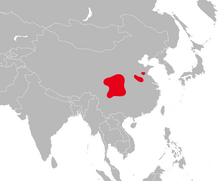Reeves's pheasant
| Reeves's pheasant | |
|---|---|
 |
|
| Male | |
 |
|
| Female | |
| Scientific classification | |
| Kingdom: | Animalia |
| Phylum: | Chordata |
| Class: | Aves |
| Order: | Galliformes |
| Family: | Phasianidae |
| Subfamily: | Phasianinae |
| Genus: | Syrmaticus |
| Species: | S. reevesii |
| Binomial name | |
|
Syrmaticus reevesii (Gray, 1829) |
|
 |
|
| Native Range of S. reevesii | |
The Reeves's pheasant (Syrmaticus reevesii) is a large pheasant within the genus Syrmaticus. It is endemic to China. It is named for the British naturalist John Reeves, who first introduced live specimens to Europe in 1831.
Males measure 210 cm (83 in) long and weigh 1,529 g (3.371 lb). The male is brightly plumaged with a scaled golden white and red body plumage, grey legs, brown iris and bare red skin around eye. The head is white with a black narrow band across its eyes. The male has an extremely long silvery white tail barred with chestnut brown. This pheasant is mentioned in the 2008 edition of Guinness World Records for having the longest natural tail feather of any bird species; a record formerly held by the crested argus pheasant. The tail can measure up to 2.4 m (7.9 ft) long.
Females measure 75 cm (30 in) long and weigh 949 g (2.092 lb). They are brown with a blackish crown, a buff face and greyish brown barred tail feathers. The females are about the same size as a male common pheasant.
There are no known subspecies, but there is some variation in plumage.
The Reeves's pheasant is endemic to evergreen forests of central and eastern China. Where introduced, they also inhabit farmland close to woodlands. The tail of the male bird grows approximately 30 cm (12 in) every year.
They have been introduced for sport and ornamental purposes to the United States, Czech Republic, France and the United Kingdom. In the latter three countries, they have built up small breeding populations, and are still released on a small scale for shooting, often alongside common pheasants.
Due to ongoing habitat loss, and overhunting for food and its tail plumes, the Reeves's pheasant is evaluated as Vulnerable on the IUCN Red List of Threatened Species. There are thought to be only around 2000 birds remaining in the wild.
...
Wikipedia

